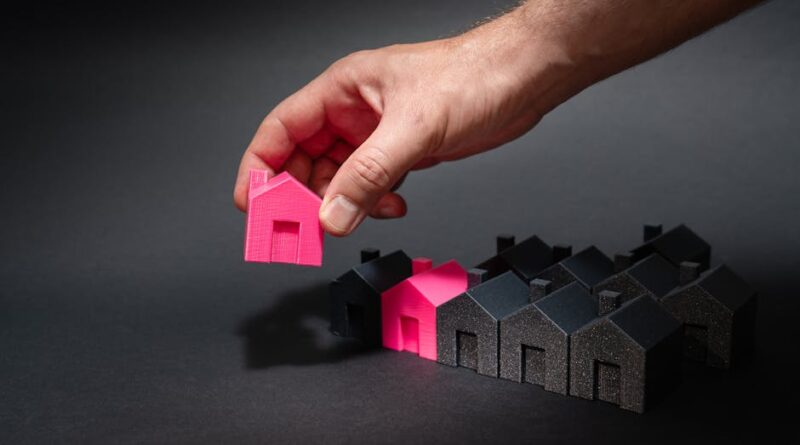How to Choose the Right Investment Property
Are you thinking about investing in property? You’re not alone. Many people see real estate as a great way to build wealth. But how do you choose the right investment property? It can feel overwhelming. However, with the right tips, you can make informed decisions that lead to success.
In this article, well break down the essential steps to find the perfect investment property. By the end, youll feel more confident in your ability to pick a profitable option.
What Should You Consider First?

Before diving into the market, ask yourself some key questions:
- What is your budget?
- Are you looking for rental income or a fix-and-flip?
- What area are you interested in?
Understanding your goals will set the foundation for your property search. For example, if you want steady rental income, look for properties in areas with high rental demand.
Why Location Matters

Location is often called the heart of real estate. But why is it so important? A good location can increase your property’s value over time. It also attracts quality tenants.
When evaluating locations, consider:
- Proximity to schools, parks, and public transport.
- Crime rates and safety.
- Future development plans in the area.
For example, buying a property near a new shopping center can lead to increased demand. More people want to live close to conveniences.
What Type of Property Should You Invest In?

There are many types of investment properties. Each has it’s pros and cons. Here are some common types:
- Single-family homes: Easier to manage and finance.
- Multi-family units: Higher income potential.
- Commercial properties: Potential for long-term tenants but more complex.
- Vacation rentals: Seasonal income but requires management.
Consider your lifestyle and how much time you can dedicate to managing a property. For instance, if you want a hands-on approach, a single-family home might be best.
How Can You Analyze Investment Potential?

Once you have a property in mind, it’s essential to analyze it’s potential. Here are key metrics to evaluate:
- Cash Flow: Calculate expected rental income minus expenses.
- Cap Rate: This shows your return on investment. Divide net operating income by the property price.
- Appreciation: Look at past price trends in the area.
For example, if a property costs $200,000 and generates $20,000 in net income per year, the cap rate is 10%. This means you’re making a strong return.
What Are the Costs Involved?
Understanding the costs is vital to avoid surprises later. Beyond the purchase price, consider these expenses:
- Property Taxes: Varies by location and can be significant.
- Insurance: Essential for protecting your investment.
- Maintenance: Regular upkeep is necessary to keep tenants happy.
- Management Fees: If you hire a property manager, factor in their fees.
For instance, if your property generates $1,500 monthly in rent, but your total monthly expenses are $1,200, your cash flow is $300. This helps you see your profitability.
Why Is Financing Important?
How you finance your investment affects your overall returns. Here are common financing options:
- Conventional Loans: Standard option but requires good credit.
- FHA Loans: Good for first-time buyers with lower down payments.
- Hard Money Loans: Quick funding but comes with higher interest rates.
Choose a financing method that aligns with your investment strategy. For example, if you plan to renovate a property, a hard money loan can provide quick cash.
How Important Is Market Research?
Understanding the real estate market is crucial. Research can help you spot trends and make better decisions. Heres what to look for:
- Local Market Conditions: Is it a buyer’s or seller’s market?
- Rental Market: Are rental prices rising or falling?
- Economic Indicators: Job growth and population trends affect demand.
For instance, if a new tech company moves into town, more jobs may create more housing demand. This could be a good time to invest!
What Are the Risks Involved?
All investments come with risks. it’s essential to be aware of potential pitfalls:
- Market Fluctuations: Property values can go up and down.
- Vacancy Rates: A property can sit empty, costing you money.
- Unexpected Repairs: Things break, and repairs can add up.
Having a financial cushion can help you weather tough times. For example, setting aside a portion of your rental income for emergencies is a smart strategy.
Should You Hire a Real Estate Agent?
A good real estate agent can be a valuable asset. They know the market and can help you find properties that meet your criteria. Heres why you might consider hiring one:
- Local Knowledge: Agents know the best neighborhoods.
- Negotiation Skills: They can help you get a better price.
- Access to Listings: Agents have access to listings before they hit the market.
If you’re new to investing, having an experienced agent can simplify the process.
What Are the Final Steps?
Once you find a property you like, it’s time to move forward. Here are the final steps:
- Get a Home Inspection: Make sure the property is in good shape.
- Make an Offer: Work with your agent to present a competitive offer.
- Close the Deal: Finalize financing and complete the paperwork.
After closing, make sure to keep an eye on your investment. Regular maintenance and tenant communication are key to long-term success.
What Are Your Actionable Takeaways?
Choosing the right investment property doesnt have to be difficult. Here are some quick tips:
- Define your investment goals.
- Research locations carefully.
- Analyze potential properties with key metrics.
- Understand all costs involved.
- Consider working with a knowledgeable agent.
Investing in real estate can be rewarding. With the right knowledge and preparation, you can make smart choices. Start by assessing your goals and doing your homework. For more tips on investment properties, check out this [resource from Investopedia](https://www.investopedia.com/terms/r/real-estate-investment.asp).
As you embark on your property investment journey, remember to stay informed, be patient, and trust your instincts. Good luck!



